Organisational Behaviour Report: A.M Holdings Limited Analysis
VerifiedAdded on 2020/10/05
|16
|4837
|425
Report
AI Summary
This report provides a comprehensive analysis of organisational behaviour within A.M Holdings Limited, a UK-based company. It begins by evaluating the impact of organisational culture, politics, and power dynamics on individual and team performance, highlighting the importance of a positive working environment. The report then delves into various motivational theories, particularly Maslow's Need Hierarchy, to understand how to enhance employee motivation and productivity. Further, the report differentiates between effective and ineffective teams, emphasizing the significance of clear roles and responsibilities. Finally, it explores the fundamental concepts and philosophies of organisational behaviour, offering insights into how management can navigate workplace challenges. The analysis underscores the importance of reward power and a supportive culture in driving employee engagement and achieving organisational goals.
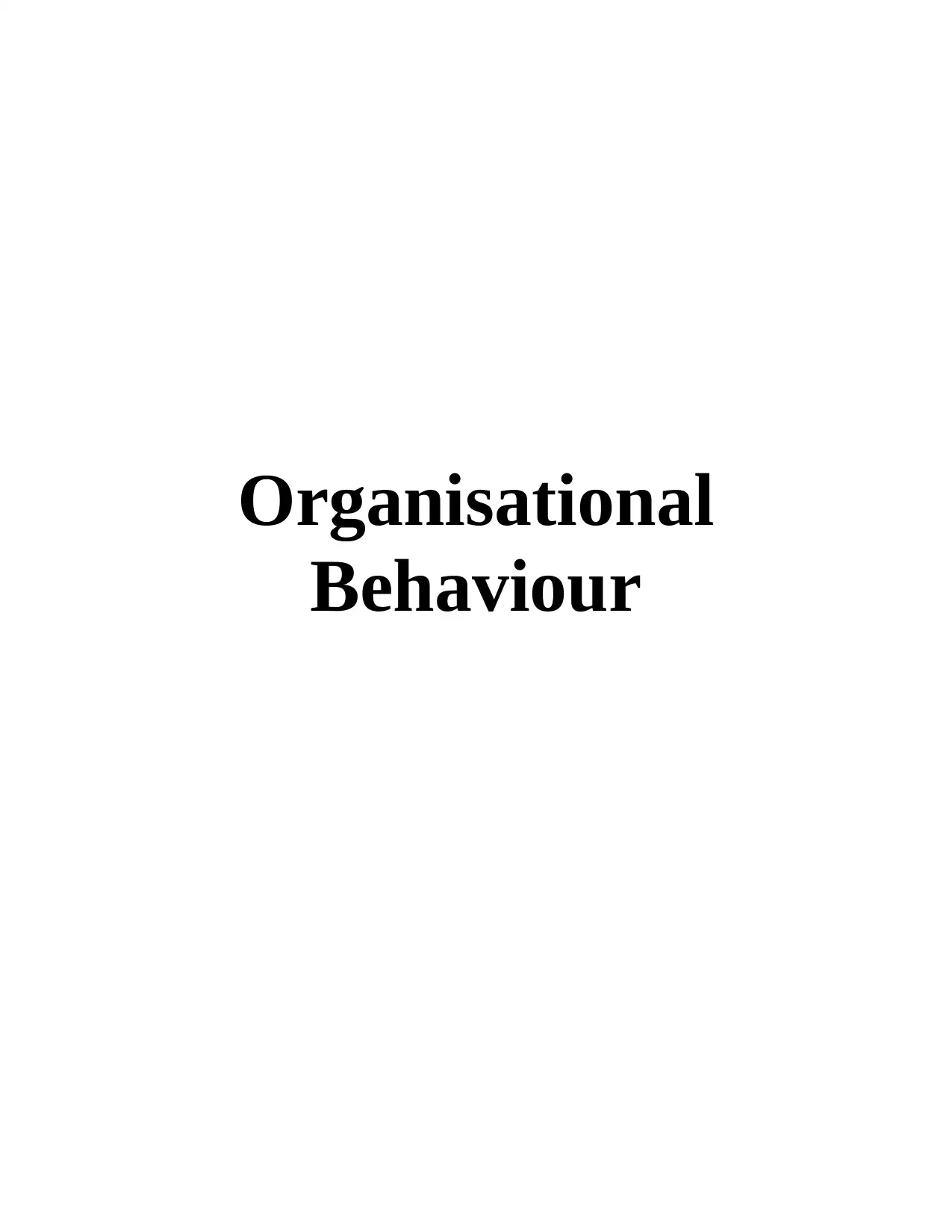
Organisational
Behaviour
Behaviour
Paraphrase This Document
Need a fresh take? Get an instant paraphrase of this document with our AI Paraphraser
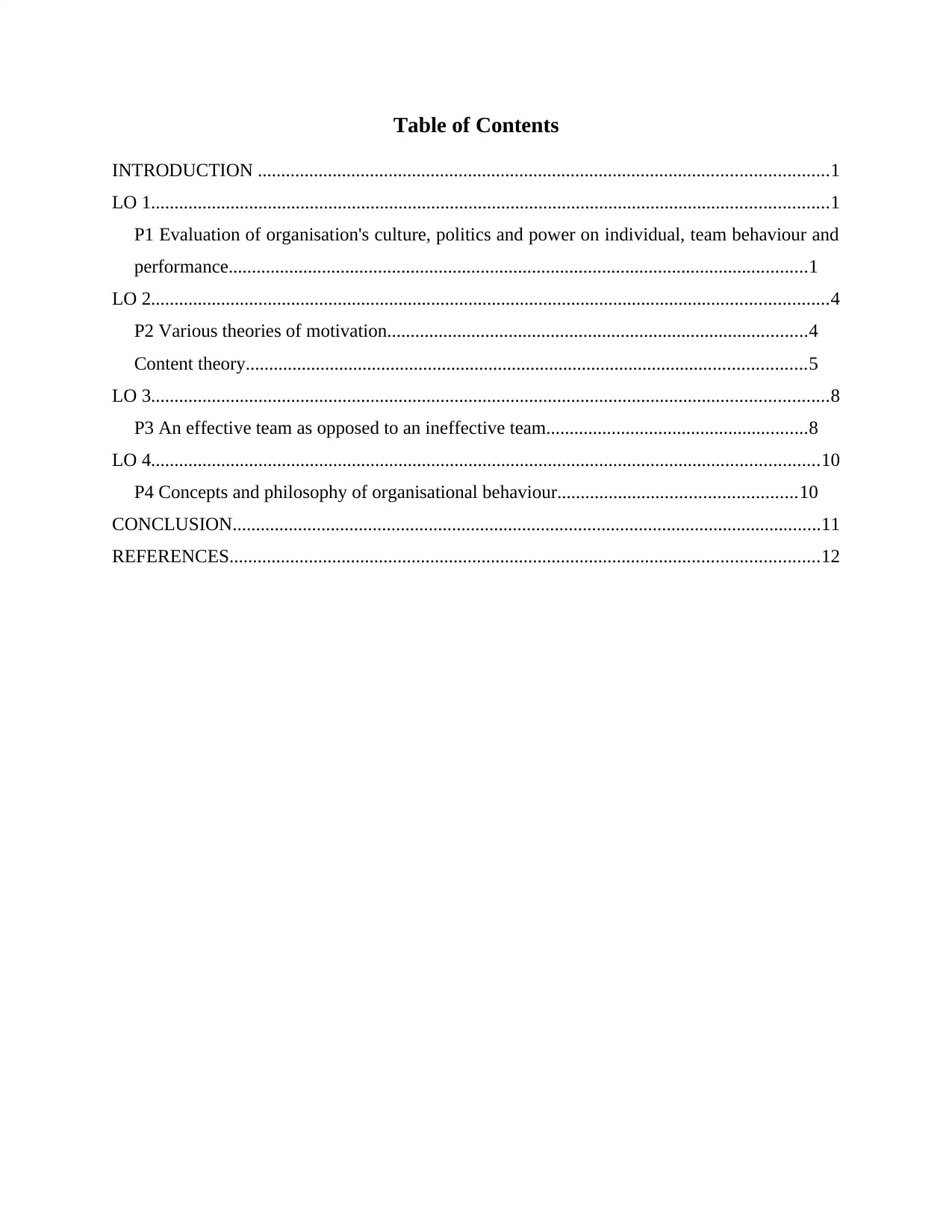
Table of Contents
INTRODUCTION ..........................................................................................................................1
LO 1.................................................................................................................................................1
P1 Evaluation of organisation's culture, politics and power on individual, team behaviour and
performance............................................................................................................................1
LO 2.................................................................................................................................................4
P2 Various theories of motivation..........................................................................................4
Content theory........................................................................................................................5
LO 3.................................................................................................................................................8
P3 An effective team as opposed to an ineffective team........................................................8
LO 4...............................................................................................................................................10
P4 Concepts and philosophy of organisational behaviour...................................................10
CONCLUSION..............................................................................................................................11
REFERENCES..............................................................................................................................12
INTRODUCTION ..........................................................................................................................1
LO 1.................................................................................................................................................1
P1 Evaluation of organisation's culture, politics and power on individual, team behaviour and
performance............................................................................................................................1
LO 2.................................................................................................................................................4
P2 Various theories of motivation..........................................................................................4
Content theory........................................................................................................................5
LO 3.................................................................................................................................................8
P3 An effective team as opposed to an ineffective team........................................................8
LO 4...............................................................................................................................................10
P4 Concepts and philosophy of organisational behaviour...................................................10
CONCLUSION..............................................................................................................................11
REFERENCES..............................................................................................................................12

⊘ This is a preview!⊘
Do you want full access?
Subscribe today to unlock all pages.

Trusted by 1+ million students worldwide
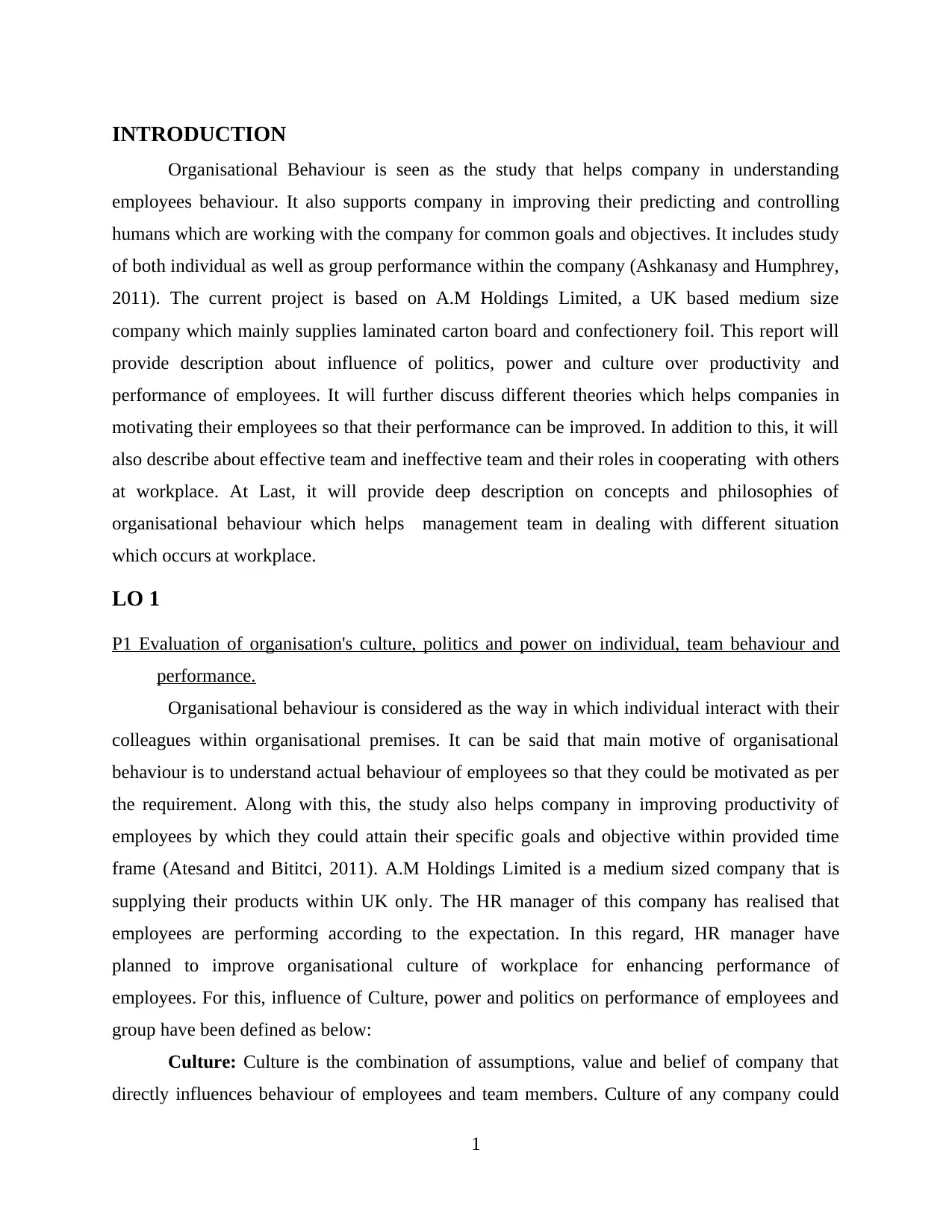
INTRODUCTION
Organisational Behaviour is seen as the study that helps company in understanding
employees behaviour. It also supports company in improving their predicting and controlling
humans which are working with the company for common goals and objectives. It includes study
of both individual as well as group performance within the company (Ashkanasy and Humphrey,
2011). The current project is based on A.M Holdings Limited, a UK based medium size
company which mainly supplies laminated carton board and confectionery foil. This report will
provide description about influence of politics, power and culture over productivity and
performance of employees. It will further discuss different theories which helps companies in
motivating their employees so that their performance can be improved. In addition to this, it will
also describe about effective team and ineffective team and their roles in cooperating with others
at workplace. At Last, it will provide deep description on concepts and philosophies of
organisational behaviour which helps management team in dealing with different situation
which occurs at workplace.
LO 1
P1 Evaluation of organisation's culture, politics and power on individual, team behaviour and
performance.
Organisational behaviour is considered as the way in which individual interact with their
colleagues within organisational premises. It can be said that main motive of organisational
behaviour is to understand actual behaviour of employees so that they could be motivated as per
the requirement. Along with this, the study also helps company in improving productivity of
employees by which they could attain their specific goals and objective within provided time
frame (Atesand and Bititci, 2011). A.M Holdings Limited is a medium sized company that is
supplying their products within UK only. The HR manager of this company has realised that
employees are performing according to the expectation. In this regard, HR manager have
planned to improve organisational culture of workplace for enhancing performance of
employees. For this, influence of Culture, power and politics on performance of employees and
group have been defined as below:
Culture: Culture is the combination of assumptions, value and belief of company that
directly influences behaviour of employees and team members. Culture of any company could
1
Organisational Behaviour is seen as the study that helps company in understanding
employees behaviour. It also supports company in improving their predicting and controlling
humans which are working with the company for common goals and objectives. It includes study
of both individual as well as group performance within the company (Ashkanasy and Humphrey,
2011). The current project is based on A.M Holdings Limited, a UK based medium size
company which mainly supplies laminated carton board and confectionery foil. This report will
provide description about influence of politics, power and culture over productivity and
performance of employees. It will further discuss different theories which helps companies in
motivating their employees so that their performance can be improved. In addition to this, it will
also describe about effective team and ineffective team and their roles in cooperating with others
at workplace. At Last, it will provide deep description on concepts and philosophies of
organisational behaviour which helps management team in dealing with different situation
which occurs at workplace.
LO 1
P1 Evaluation of organisation's culture, politics and power on individual, team behaviour and
performance.
Organisational behaviour is considered as the way in which individual interact with their
colleagues within organisational premises. It can be said that main motive of organisational
behaviour is to understand actual behaviour of employees so that they could be motivated as per
the requirement. Along with this, the study also helps company in improving productivity of
employees by which they could attain their specific goals and objective within provided time
frame (Atesand and Bititci, 2011). A.M Holdings Limited is a medium sized company that is
supplying their products within UK only. The HR manager of this company has realised that
employees are performing according to the expectation. In this regard, HR manager have
planned to improve organisational culture of workplace for enhancing performance of
employees. For this, influence of Culture, power and politics on performance of employees and
group have been defined as below:
Culture: Culture is the combination of assumptions, value and belief of company that
directly influences behaviour of employees and team members. Culture of any company could
1
Paraphrase This Document
Need a fresh take? Get an instant paraphrase of this document with our AI Paraphraser
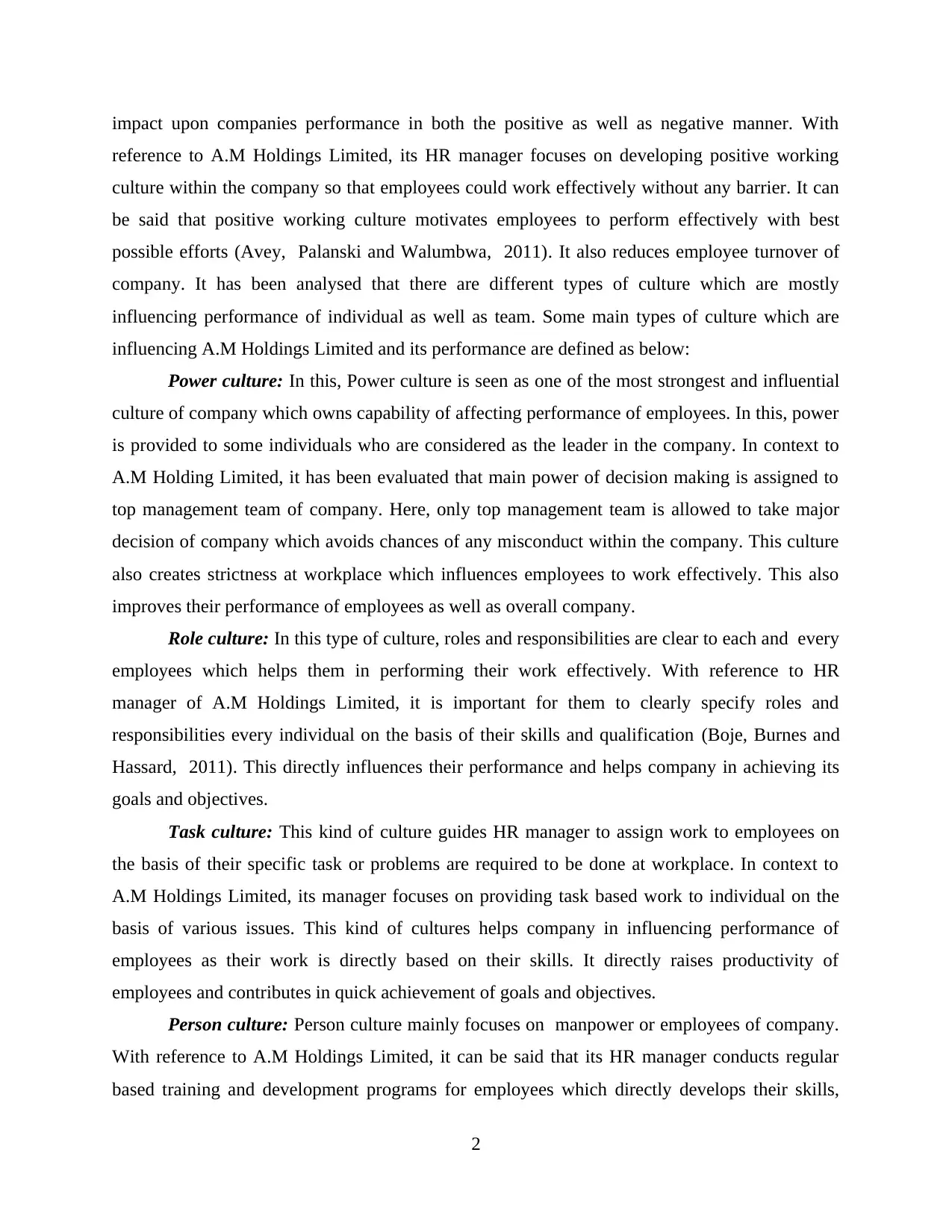
impact upon companies performance in both the positive as well as negative manner. With
reference to A.M Holdings Limited, its HR manager focuses on developing positive working
culture within the company so that employees could work effectively without any barrier. It can
be said that positive working culture motivates employees to perform effectively with best
possible efforts (Avey, Palanski and Walumbwa, 2011). It also reduces employee turnover of
company. It has been analysed that there are different types of culture which are mostly
influencing performance of individual as well as team. Some main types of culture which are
influencing A.M Holdings Limited and its performance are defined as below:
Power culture: In this, Power culture is seen as one of the most strongest and influential
culture of company which owns capability of affecting performance of employees. In this, power
is provided to some individuals who are considered as the leader in the company. In context to
A.M Holding Limited, it has been evaluated that main power of decision making is assigned to
top management team of company. Here, only top management team is allowed to take major
decision of company which avoids chances of any misconduct within the company. This culture
also creates strictness at workplace which influences employees to work effectively. This also
improves their performance of employees as well as overall company.
Role culture: In this type of culture, roles and responsibilities are clear to each and every
employees which helps them in performing their work effectively. With reference to HR
manager of A.M Holdings Limited, it is important for them to clearly specify roles and
responsibilities every individual on the basis of their skills and qualification (Boje, Burnes and
Hassard, 2011). This directly influences their performance and helps company in achieving its
goals and objectives.
Task culture: This kind of culture guides HR manager to assign work to employees on
the basis of their specific task or problems are required to be done at workplace. In context to
A.M Holdings Limited, its manager focuses on providing task based work to individual on the
basis of various issues. This kind of cultures helps company in influencing performance of
employees as their work is directly based on their skills. It directly raises productivity of
employees and contributes in quick achievement of goals and objectives.
Person culture: Person culture mainly focuses on manpower or employees of company.
With reference to A.M Holdings Limited, it can be said that its HR manager conducts regular
based training and development programs for employees which directly develops their skills,
2
reference to A.M Holdings Limited, its HR manager focuses on developing positive working
culture within the company so that employees could work effectively without any barrier. It can
be said that positive working culture motivates employees to perform effectively with best
possible efforts (Avey, Palanski and Walumbwa, 2011). It also reduces employee turnover of
company. It has been analysed that there are different types of culture which are mostly
influencing performance of individual as well as team. Some main types of culture which are
influencing A.M Holdings Limited and its performance are defined as below:
Power culture: In this, Power culture is seen as one of the most strongest and influential
culture of company which owns capability of affecting performance of employees. In this, power
is provided to some individuals who are considered as the leader in the company. In context to
A.M Holding Limited, it has been evaluated that main power of decision making is assigned to
top management team of company. Here, only top management team is allowed to take major
decision of company which avoids chances of any misconduct within the company. This culture
also creates strictness at workplace which influences employees to work effectively. This also
improves their performance of employees as well as overall company.
Role culture: In this type of culture, roles and responsibilities are clear to each and every
employees which helps them in performing their work effectively. With reference to HR
manager of A.M Holdings Limited, it is important for them to clearly specify roles and
responsibilities every individual on the basis of their skills and qualification (Boje, Burnes and
Hassard, 2011). This directly influences their performance and helps company in achieving its
goals and objectives.
Task culture: This kind of culture guides HR manager to assign work to employees on
the basis of their specific task or problems are required to be done at workplace. In context to
A.M Holdings Limited, its manager focuses on providing task based work to individual on the
basis of various issues. This kind of cultures helps company in influencing performance of
employees as their work is directly based on their skills. It directly raises productivity of
employees and contributes in quick achievement of goals and objectives.
Person culture: Person culture mainly focuses on manpower or employees of company.
With reference to A.M Holdings Limited, it can be said that its HR manager conducts regular
based training and development programs for employees which directly develops their skills,
2
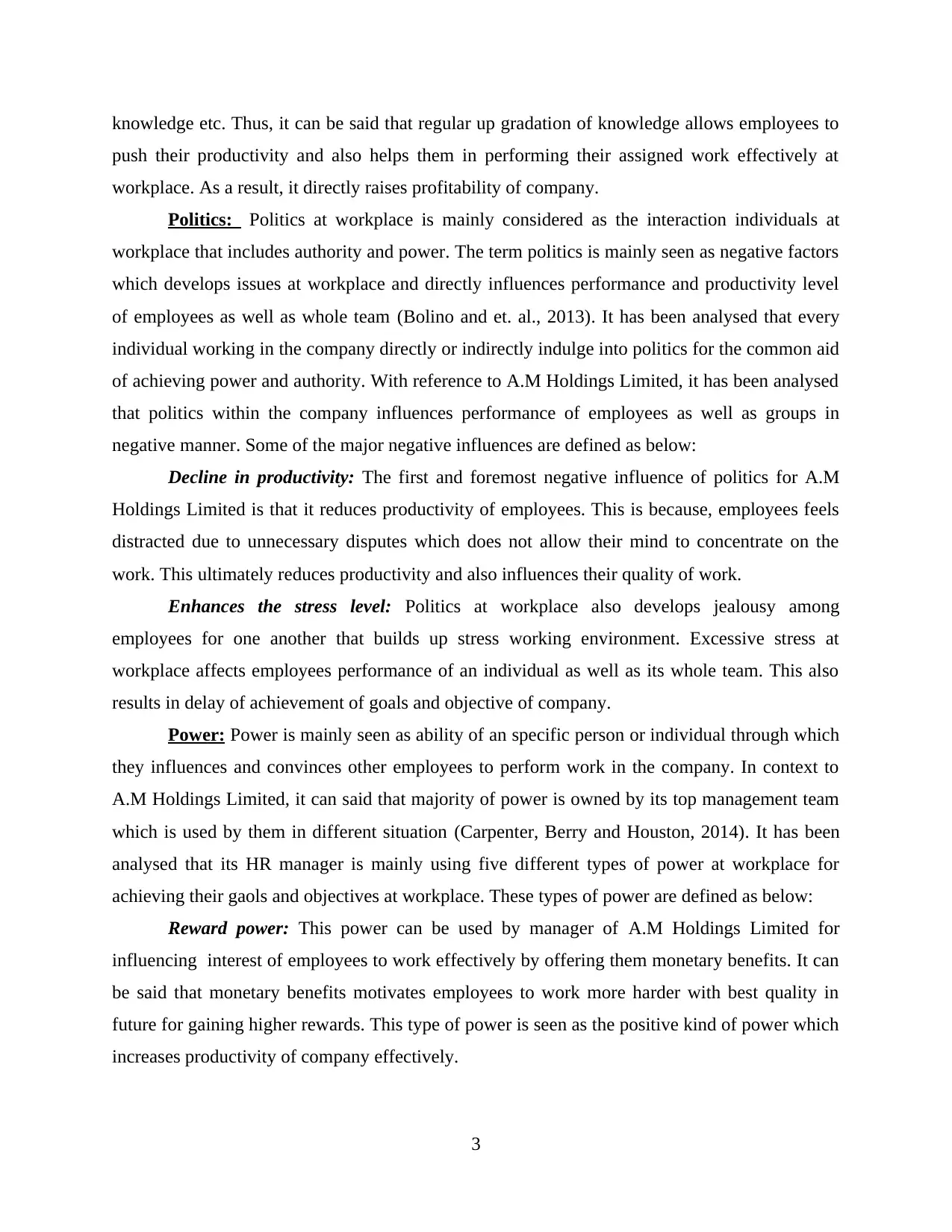
knowledge etc. Thus, it can be said that regular up gradation of knowledge allows employees to
push their productivity and also helps them in performing their assigned work effectively at
workplace. As a result, it directly raises profitability of company.
Politics: Politics at workplace is mainly considered as the interaction individuals at
workplace that includes authority and power. The term politics is mainly seen as negative factors
which develops issues at workplace and directly influences performance and productivity level
of employees as well as whole team (Bolino and et. al., 2013). It has been analysed that every
individual working in the company directly or indirectly indulge into politics for the common aid
of achieving power and authority. With reference to A.M Holdings Limited, it has been analysed
that politics within the company influences performance of employees as well as groups in
negative manner. Some of the major negative influences are defined as below:
Decline in productivity: The first and foremost negative influence of politics for A.M
Holdings Limited is that it reduces productivity of employees. This is because, employees feels
distracted due to unnecessary disputes which does not allow their mind to concentrate on the
work. This ultimately reduces productivity and also influences their quality of work.
Enhances the stress level: Politics at workplace also develops jealousy among
employees for one another that builds up stress working environment. Excessive stress at
workplace affects employees performance of an individual as well as its whole team. This also
results in delay of achievement of goals and objective of company.
Power: Power is mainly seen as ability of an specific person or individual through which
they influences and convinces other employees to perform work in the company. In context to
A.M Holdings Limited, it can said that majority of power is owned by its top management team
which is used by them in different situation (Carpenter, Berry and Houston, 2014). It has been
analysed that its HR manager is mainly using five different types of power at workplace for
achieving their gaols and objectives at workplace. These types of power are defined as below:
Reward power: This power can be used by manager of A.M Holdings Limited for
influencing interest of employees to work effectively by offering them monetary benefits. It can
be said that monetary benefits motivates employees to work more harder with best quality in
future for gaining higher rewards. This type of power is seen as the positive kind of power which
increases productivity of company effectively.
3
push their productivity and also helps them in performing their assigned work effectively at
workplace. As a result, it directly raises profitability of company.
Politics: Politics at workplace is mainly considered as the interaction individuals at
workplace that includes authority and power. The term politics is mainly seen as negative factors
which develops issues at workplace and directly influences performance and productivity level
of employees as well as whole team (Bolino and et. al., 2013). It has been analysed that every
individual working in the company directly or indirectly indulge into politics for the common aid
of achieving power and authority. With reference to A.M Holdings Limited, it has been analysed
that politics within the company influences performance of employees as well as groups in
negative manner. Some of the major negative influences are defined as below:
Decline in productivity: The first and foremost negative influence of politics for A.M
Holdings Limited is that it reduces productivity of employees. This is because, employees feels
distracted due to unnecessary disputes which does not allow their mind to concentrate on the
work. This ultimately reduces productivity and also influences their quality of work.
Enhances the stress level: Politics at workplace also develops jealousy among
employees for one another that builds up stress working environment. Excessive stress at
workplace affects employees performance of an individual as well as its whole team. This also
results in delay of achievement of goals and objective of company.
Power: Power is mainly seen as ability of an specific person or individual through which
they influences and convinces other employees to perform work in the company. In context to
A.M Holdings Limited, it can said that majority of power is owned by its top management team
which is used by them in different situation (Carpenter, Berry and Houston, 2014). It has been
analysed that its HR manager is mainly using five different types of power at workplace for
achieving their gaols and objectives at workplace. These types of power are defined as below:
Reward power: This power can be used by manager of A.M Holdings Limited for
influencing interest of employees to work effectively by offering them monetary benefits. It can
be said that monetary benefits motivates employees to work more harder with best quality in
future for gaining higher rewards. This type of power is seen as the positive kind of power which
increases productivity of company effectively.
3
⊘ This is a preview!⊘
Do you want full access?
Subscribe today to unlock all pages.

Trusted by 1+ million students worldwide
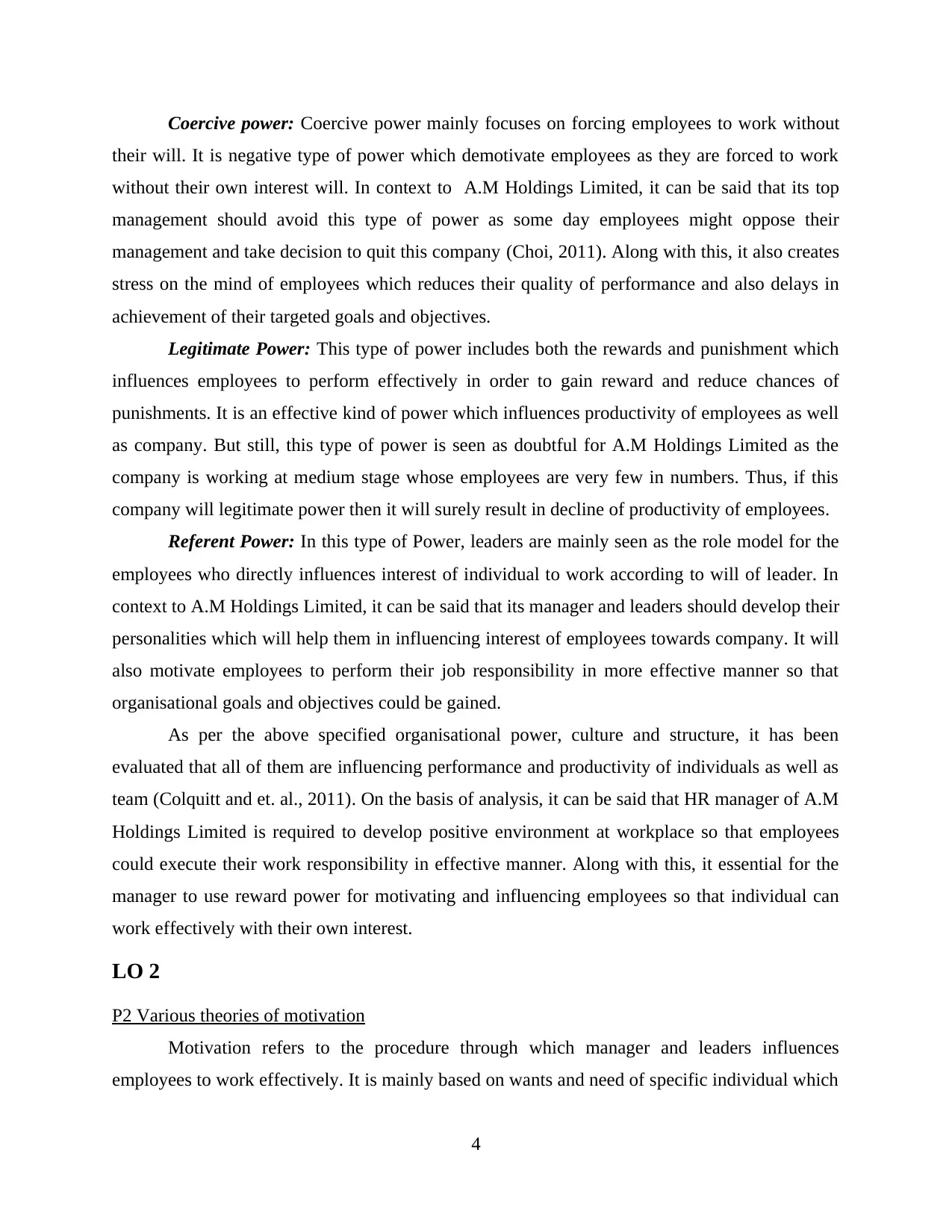
Coercive power: Coercive power mainly focuses on forcing employees to work without
their will. It is negative type of power which demotivate employees as they are forced to work
without their own interest will. In context to A.M Holdings Limited, it can be said that its top
management should avoid this type of power as some day employees might oppose their
management and take decision to quit this company (Choi, 2011). Along with this, it also creates
stress on the mind of employees which reduces their quality of performance and also delays in
achievement of their targeted goals and objectives.
Legitimate Power: This type of power includes both the rewards and punishment which
influences employees to perform effectively in order to gain reward and reduce chances of
punishments. It is an effective kind of power which influences productivity of employees as well
as company. But still, this type of power is seen as doubtful for A.M Holdings Limited as the
company is working at medium stage whose employees are very few in numbers. Thus, if this
company will legitimate power then it will surely result in decline of productivity of employees.
Referent Power: In this type of Power, leaders are mainly seen as the role model for the
employees who directly influences interest of individual to work according to will of leader. In
context to A.M Holdings Limited, it can be said that its manager and leaders should develop their
personalities which will help them in influencing interest of employees towards company. It will
also motivate employees to perform their job responsibility in more effective manner so that
organisational goals and objectives could be gained.
As per the above specified organisational power, culture and structure, it has been
evaluated that all of them are influencing performance and productivity of individuals as well as
team (Colquitt and et. al., 2011). On the basis of analysis, it can be said that HR manager of A.M
Holdings Limited is required to develop positive environment at workplace so that employees
could execute their work responsibility in effective manner. Along with this, it essential for the
manager to use reward power for motivating and influencing employees so that individual can
work effectively with their own interest.
LO 2
P2 Various theories of motivation
Motivation refers to the procedure through which manager and leaders influences
employees to work effectively. It is mainly based on wants and need of specific individual which
4
their will. It is negative type of power which demotivate employees as they are forced to work
without their own interest will. In context to A.M Holdings Limited, it can be said that its top
management should avoid this type of power as some day employees might oppose their
management and take decision to quit this company (Choi, 2011). Along with this, it also creates
stress on the mind of employees which reduces their quality of performance and also delays in
achievement of their targeted goals and objectives.
Legitimate Power: This type of power includes both the rewards and punishment which
influences employees to perform effectively in order to gain reward and reduce chances of
punishments. It is an effective kind of power which influences productivity of employees as well
as company. But still, this type of power is seen as doubtful for A.M Holdings Limited as the
company is working at medium stage whose employees are very few in numbers. Thus, if this
company will legitimate power then it will surely result in decline of productivity of employees.
Referent Power: In this type of Power, leaders are mainly seen as the role model for the
employees who directly influences interest of individual to work according to will of leader. In
context to A.M Holdings Limited, it can be said that its manager and leaders should develop their
personalities which will help them in influencing interest of employees towards company. It will
also motivate employees to perform their job responsibility in more effective manner so that
organisational goals and objectives could be gained.
As per the above specified organisational power, culture and structure, it has been
evaluated that all of them are influencing performance and productivity of individuals as well as
team (Colquitt and et. al., 2011). On the basis of analysis, it can be said that HR manager of A.M
Holdings Limited is required to develop positive environment at workplace so that employees
could execute their work responsibility in effective manner. Along with this, it essential for the
manager to use reward power for motivating and influencing employees so that individual can
work effectively with their own interest.
LO 2
P2 Various theories of motivation
Motivation refers to the procedure through which manager and leaders influences
employees to work effectively. It is mainly based on wants and need of specific individual which
4
Paraphrase This Document
Need a fresh take? Get an instant paraphrase of this document with our AI Paraphraser
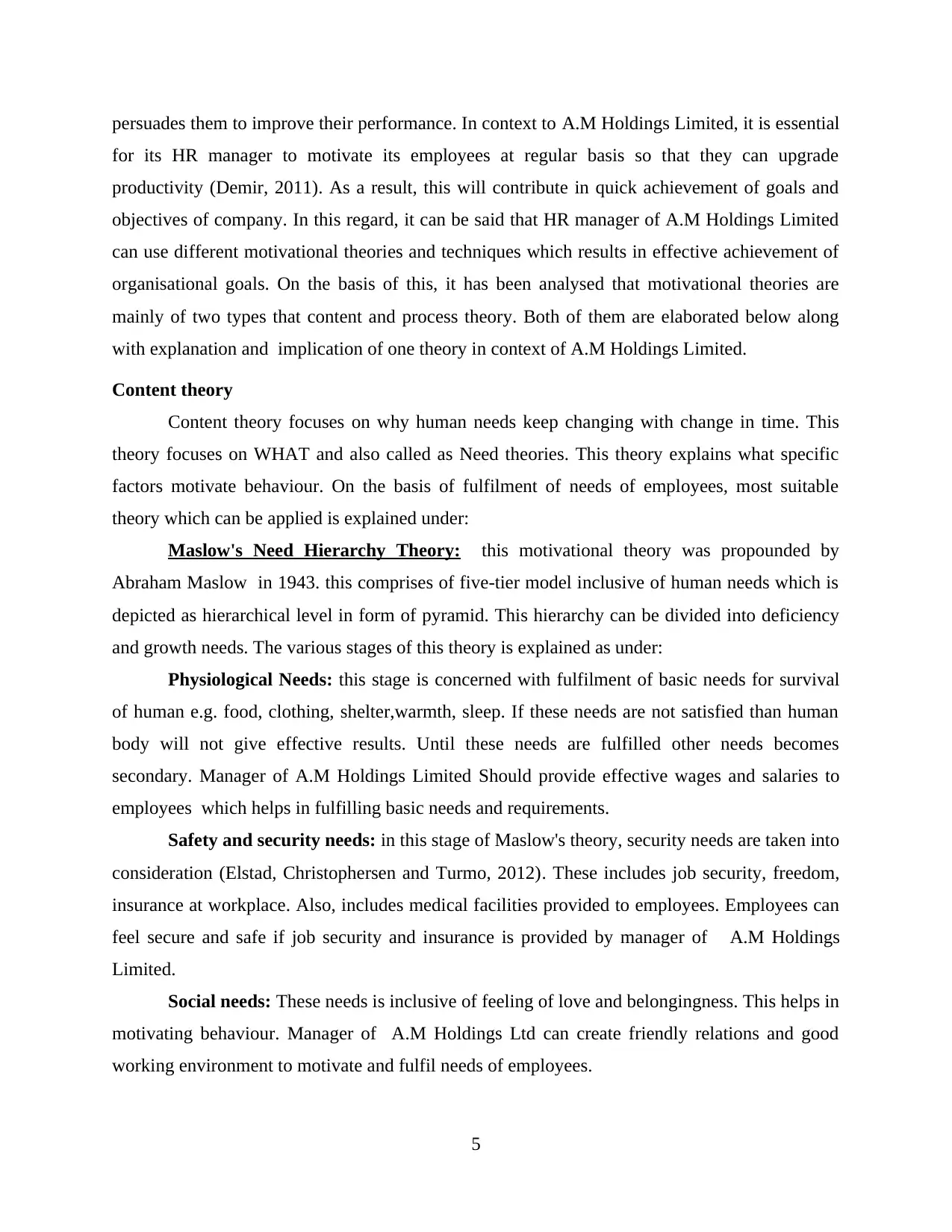
persuades them to improve their performance. In context to A.M Holdings Limited, it is essential
for its HR manager to motivate its employees at regular basis so that they can upgrade
productivity (Demir, 2011). As a result, this will contribute in quick achievement of goals and
objectives of company. In this regard, it can be said that HR manager of A.M Holdings Limited
can use different motivational theories and techniques which results in effective achievement of
organisational goals. On the basis of this, it has been analysed that motivational theories are
mainly of two types that content and process theory. Both of them are elaborated below along
with explanation and implication of one theory in context of A.M Holdings Limited.
Content theory
Content theory focuses on why human needs keep changing with change in time. This
theory focuses on WHAT and also called as Need theories. This theory explains what specific
factors motivate behaviour. On the basis of fulfilment of needs of employees, most suitable
theory which can be applied is explained under:
Maslow's Need Hierarchy Theory: this motivational theory was propounded by
Abraham Maslow in 1943. this comprises of five-tier model inclusive of human needs which is
depicted as hierarchical level in form of pyramid. This hierarchy can be divided into deficiency
and growth needs. The various stages of this theory is explained as under:
Physiological Needs: this stage is concerned with fulfilment of basic needs for survival
of human e.g. food, clothing, shelter,warmth, sleep. If these needs are not satisfied than human
body will not give effective results. Until these needs are fulfilled other needs becomes
secondary. Manager of A.M Holdings Limited Should provide effective wages and salaries to
employees which helps in fulfilling basic needs and requirements.
Safety and security needs: in this stage of Maslow's theory, security needs are taken into
consideration (Elstad, Christophersen and Turmo, 2012). These includes job security, freedom,
insurance at workplace. Also, includes medical facilities provided to employees. Employees can
feel secure and safe if job security and insurance is provided by manager of A.M Holdings
Limited.
Social needs: These needs is inclusive of feeling of love and belongingness. This helps in
motivating behaviour. Manager of A.M Holdings Ltd can create friendly relations and good
working environment to motivate and fulfil needs of employees.
5
for its HR manager to motivate its employees at regular basis so that they can upgrade
productivity (Demir, 2011). As a result, this will contribute in quick achievement of goals and
objectives of company. In this regard, it can be said that HR manager of A.M Holdings Limited
can use different motivational theories and techniques which results in effective achievement of
organisational goals. On the basis of this, it has been analysed that motivational theories are
mainly of two types that content and process theory. Both of them are elaborated below along
with explanation and implication of one theory in context of A.M Holdings Limited.
Content theory
Content theory focuses on why human needs keep changing with change in time. This
theory focuses on WHAT and also called as Need theories. This theory explains what specific
factors motivate behaviour. On the basis of fulfilment of needs of employees, most suitable
theory which can be applied is explained under:
Maslow's Need Hierarchy Theory: this motivational theory was propounded by
Abraham Maslow in 1943. this comprises of five-tier model inclusive of human needs which is
depicted as hierarchical level in form of pyramid. This hierarchy can be divided into deficiency
and growth needs. The various stages of this theory is explained as under:
Physiological Needs: this stage is concerned with fulfilment of basic needs for survival
of human e.g. food, clothing, shelter,warmth, sleep. If these needs are not satisfied than human
body will not give effective results. Until these needs are fulfilled other needs becomes
secondary. Manager of A.M Holdings Limited Should provide effective wages and salaries to
employees which helps in fulfilling basic needs and requirements.
Safety and security needs: in this stage of Maslow's theory, security needs are taken into
consideration (Elstad, Christophersen and Turmo, 2012). These includes job security, freedom,
insurance at workplace. Also, includes medical facilities provided to employees. Employees can
feel secure and safe if job security and insurance is provided by manager of A.M Holdings
Limited.
Social needs: These needs is inclusive of feeling of love and belongingness. This helps in
motivating behaviour. Manager of A.M Holdings Ltd can create friendly relations and good
working environment to motivate and fulfil needs of employees.
5
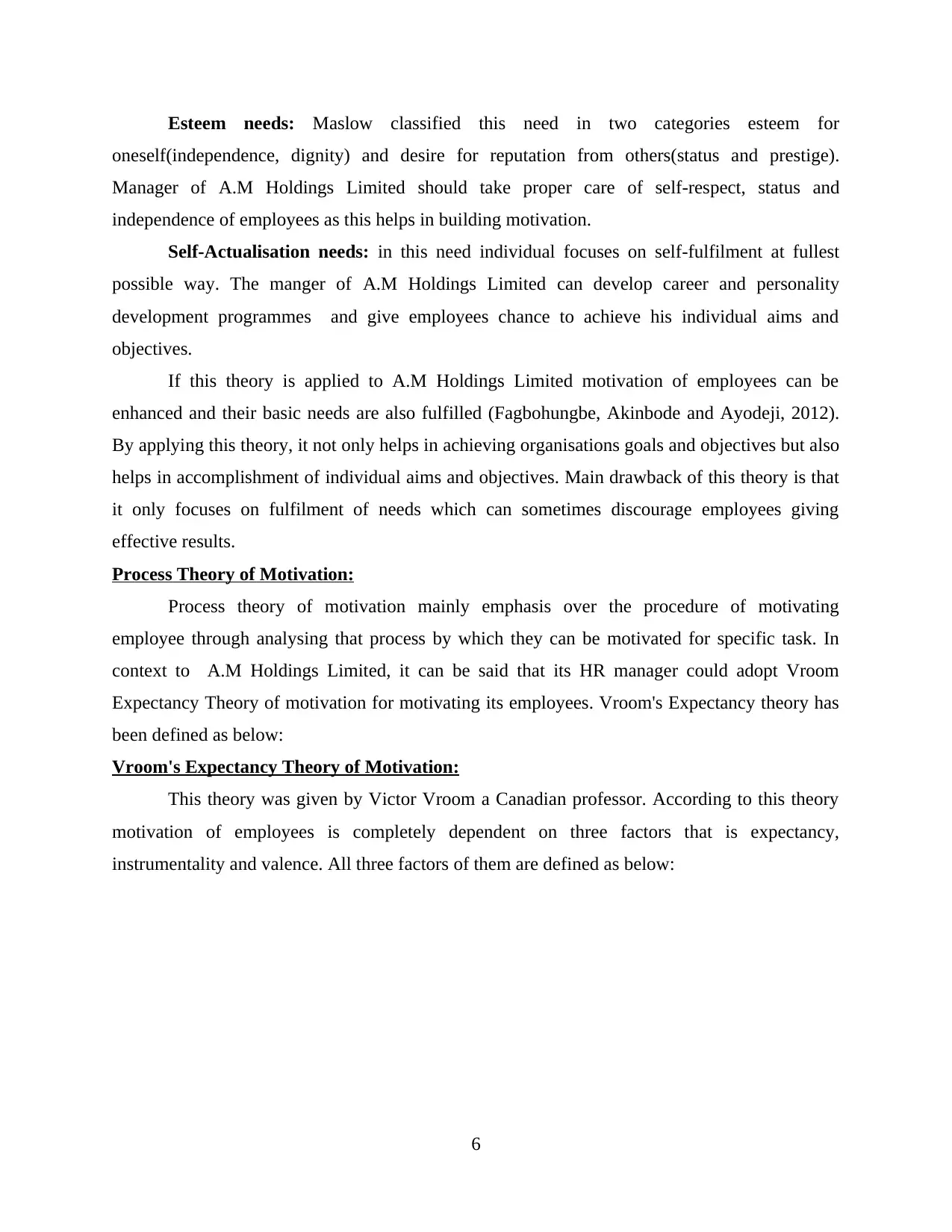
Esteem needs: Maslow classified this need in two categories esteem for
oneself(independence, dignity) and desire for reputation from others(status and prestige).
Manager of A.M Holdings Limited should take proper care of self-respect, status and
independence of employees as this helps in building motivation.
Self-Actualisation needs: in this need individual focuses on self-fulfilment at fullest
possible way. The manger of A.M Holdings Limited can develop career and personality
development programmes and give employees chance to achieve his individual aims and
objectives.
If this theory is applied to A.M Holdings Limited motivation of employees can be
enhanced and their basic needs are also fulfilled (Fagbohungbe, Akinbode and Ayodeji, 2012).
By applying this theory, it not only helps in achieving organisations goals and objectives but also
helps in accomplishment of individual aims and objectives. Main drawback of this theory is that
it only focuses on fulfilment of needs which can sometimes discourage employees giving
effective results.
Process Theory of Motivation:
Process theory of motivation mainly emphasis over the procedure of motivating
employee through analysing that process by which they can be motivated for specific task. In
context to A.M Holdings Limited, it can be said that its HR manager could adopt Vroom
Expectancy Theory of motivation for motivating its employees. Vroom's Expectancy theory has
been defined as below:
Vroom's Expectancy Theory of Motivation:
This theory was given by Victor Vroom a Canadian professor. According to this theory
motivation of employees is completely dependent on three factors that is expectancy,
instrumentality and valence. All three factors of them are defined as below:
6
oneself(independence, dignity) and desire for reputation from others(status and prestige).
Manager of A.M Holdings Limited should take proper care of self-respect, status and
independence of employees as this helps in building motivation.
Self-Actualisation needs: in this need individual focuses on self-fulfilment at fullest
possible way. The manger of A.M Holdings Limited can develop career and personality
development programmes and give employees chance to achieve his individual aims and
objectives.
If this theory is applied to A.M Holdings Limited motivation of employees can be
enhanced and their basic needs are also fulfilled (Fagbohungbe, Akinbode and Ayodeji, 2012).
By applying this theory, it not only helps in achieving organisations goals and objectives but also
helps in accomplishment of individual aims and objectives. Main drawback of this theory is that
it only focuses on fulfilment of needs which can sometimes discourage employees giving
effective results.
Process Theory of Motivation:
Process theory of motivation mainly emphasis over the procedure of motivating
employee through analysing that process by which they can be motivated for specific task. In
context to A.M Holdings Limited, it can be said that its HR manager could adopt Vroom
Expectancy Theory of motivation for motivating its employees. Vroom's Expectancy theory has
been defined as below:
Vroom's Expectancy Theory of Motivation:
This theory was given by Victor Vroom a Canadian professor. According to this theory
motivation of employees is completely dependent on three factors that is expectancy,
instrumentality and valence. All three factors of them are defined as below:
6
⊘ This is a preview!⊘
Do you want full access?
Subscribe today to unlock all pages.

Trusted by 1+ million students worldwide
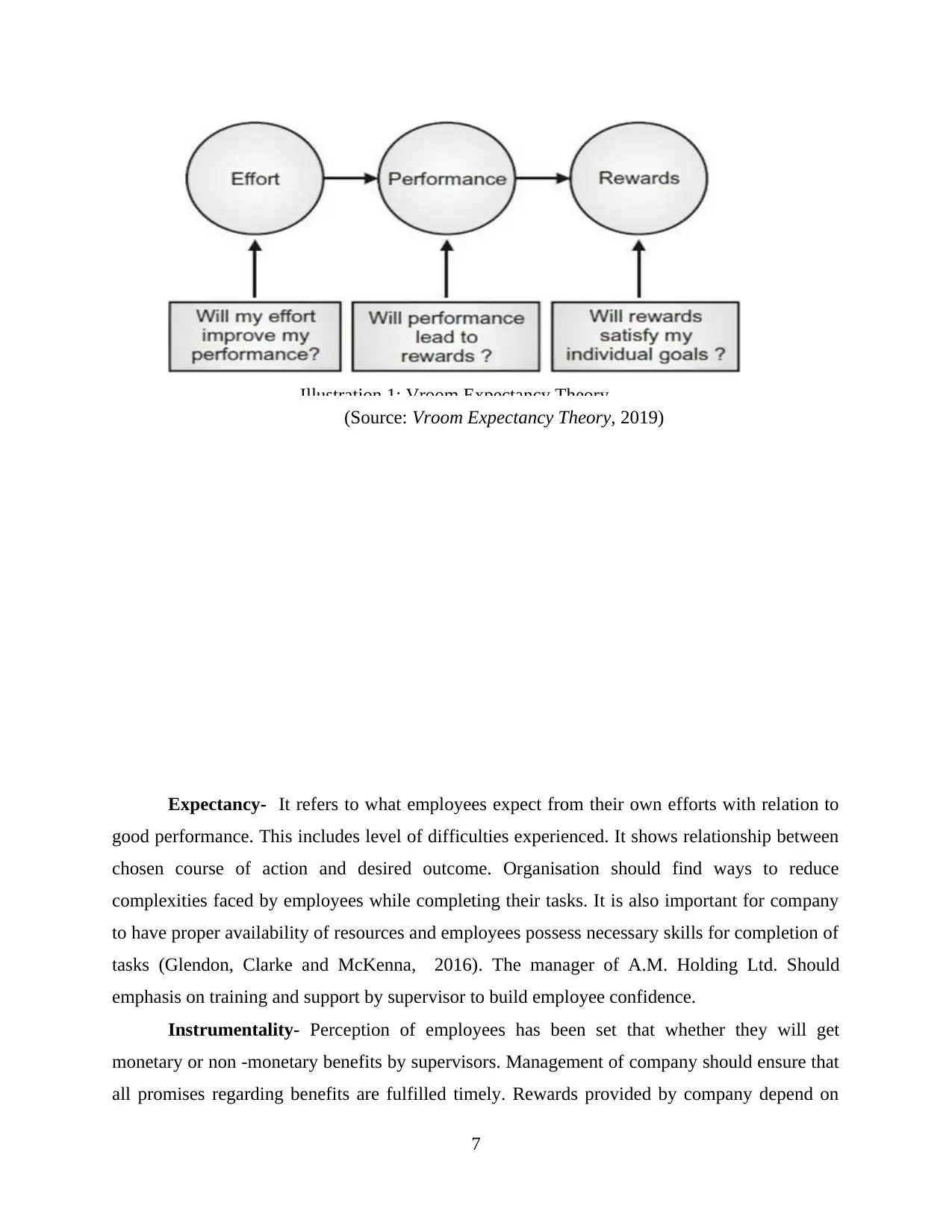
Illustration 1: Vroom Expectancy Theory
(Source: Vroom Expectancy Theory, 2019)
Expectancy- It refers to what employees expect from their own efforts with relation to
good performance. This includes level of difficulties experienced. It shows relationship between
chosen course of action and desired outcome. Organisation should find ways to reduce
complexities faced by employees while completing their tasks. It is also important for company
to have proper availability of resources and employees possess necessary skills for completion of
tasks (Glendon, Clarke and McKenna, 2016). The manager of A.M. Holding Ltd. Should
emphasis on training and support by supervisor to build employee confidence.
Instrumentality- Perception of employees has been set that whether they will get
monetary or non -monetary benefits by supervisors. Management of company should ensure that
all promises regarding benefits are fulfilled timely. Rewards provided by company depend on
7
(Source: Vroom Expectancy Theory, 2019)
Expectancy- It refers to what employees expect from their own efforts with relation to
good performance. This includes level of difficulties experienced. It shows relationship between
chosen course of action and desired outcome. Organisation should find ways to reduce
complexities faced by employees while completing their tasks. It is also important for company
to have proper availability of resources and employees possess necessary skills for completion of
tasks (Glendon, Clarke and McKenna, 2016). The manager of A.M. Holding Ltd. Should
emphasis on training and support by supervisor to build employee confidence.
Instrumentality- Perception of employees has been set that whether they will get
monetary or non -monetary benefits by supervisors. Management of company should ensure that
all promises regarding benefits are fulfilled timely. Rewards provided by company depend on
7
Paraphrase This Document
Need a fresh take? Get an instant paraphrase of this document with our AI Paraphraser
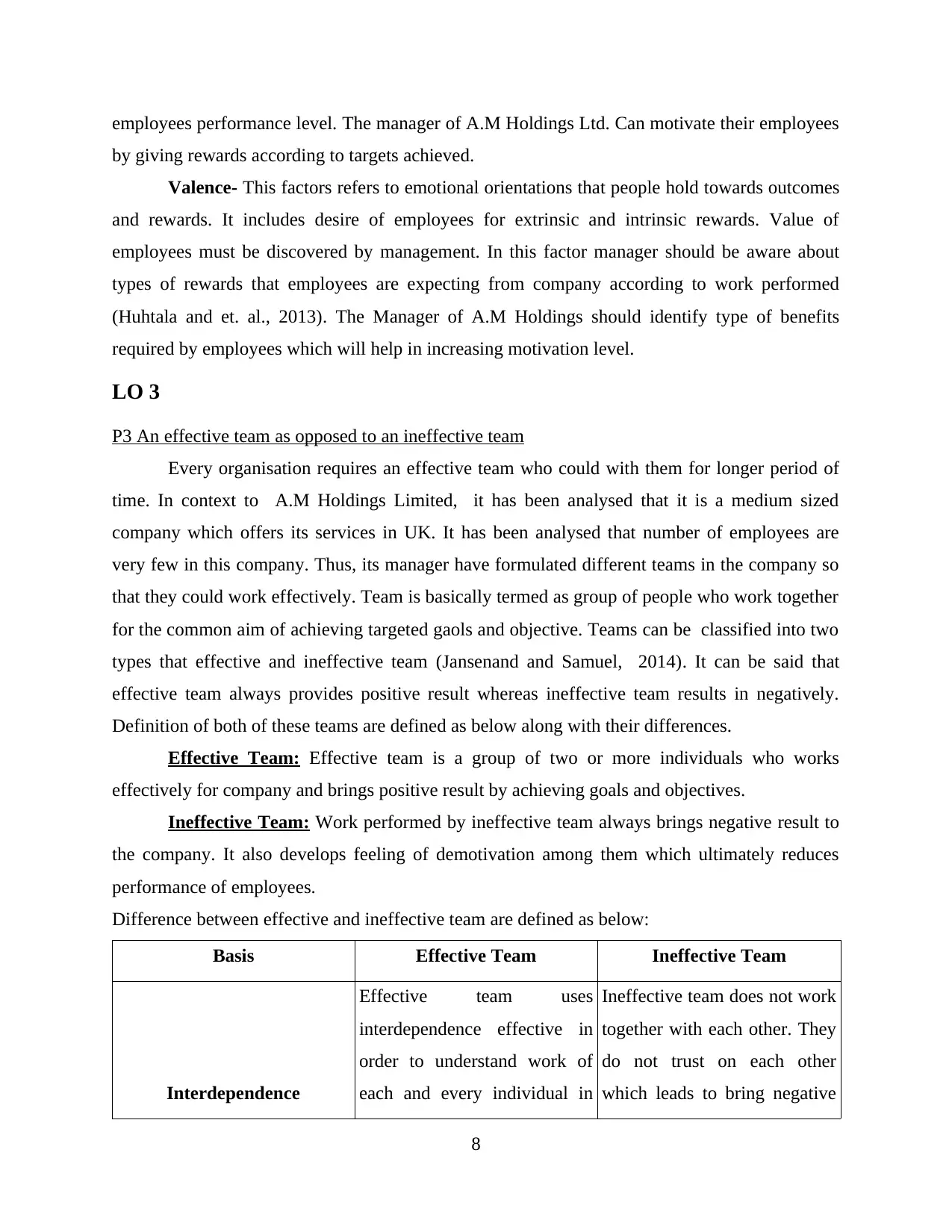
employees performance level. The manager of A.M Holdings Ltd. Can motivate their employees
by giving rewards according to targets achieved.
Valence- This factors refers to emotional orientations that people hold towards outcomes
and rewards. It includes desire of employees for extrinsic and intrinsic rewards. Value of
employees must be discovered by management. In this factor manager should be aware about
types of rewards that employees are expecting from company according to work performed
(Huhtala and et. al., 2013). The Manager of A.M Holdings should identify type of benefits
required by employees which will help in increasing motivation level.
LO 3
P3 An effective team as opposed to an ineffective team
Every organisation requires an effective team who could with them for longer period of
time. In context to A.M Holdings Limited, it has been analysed that it is a medium sized
company which offers its services in UK. It has been analysed that number of employees are
very few in this company. Thus, its manager have formulated different teams in the company so
that they could work effectively. Team is basically termed as group of people who work together
for the common aim of achieving targeted gaols and objective. Teams can be classified into two
types that effective and ineffective team (Jansenand and Samuel, 2014). It can be said that
effective team always provides positive result whereas ineffective team results in negatively.
Definition of both of these teams are defined as below along with their differences.
Effective Team: Effective team is a group of two or more individuals who works
effectively for company and brings positive result by achieving goals and objectives.
Ineffective Team: Work performed by ineffective team always brings negative result to
the company. It also develops feeling of demotivation among them which ultimately reduces
performance of employees.
Difference between effective and ineffective team are defined as below:
Basis Effective Team Ineffective Team
Interdependence
Effective team uses
interdependence effective in
order to understand work of
each and every individual in
Ineffective team does not work
together with each other. They
do not trust on each other
which leads to bring negative
8
by giving rewards according to targets achieved.
Valence- This factors refers to emotional orientations that people hold towards outcomes
and rewards. It includes desire of employees for extrinsic and intrinsic rewards. Value of
employees must be discovered by management. In this factor manager should be aware about
types of rewards that employees are expecting from company according to work performed
(Huhtala and et. al., 2013). The Manager of A.M Holdings should identify type of benefits
required by employees which will help in increasing motivation level.
LO 3
P3 An effective team as opposed to an ineffective team
Every organisation requires an effective team who could with them for longer period of
time. In context to A.M Holdings Limited, it has been analysed that it is a medium sized
company which offers its services in UK. It has been analysed that number of employees are
very few in this company. Thus, its manager have formulated different teams in the company so
that they could work effectively. Team is basically termed as group of people who work together
for the common aim of achieving targeted gaols and objective. Teams can be classified into two
types that effective and ineffective team (Jansenand and Samuel, 2014). It can be said that
effective team always provides positive result whereas ineffective team results in negatively.
Definition of both of these teams are defined as below along with their differences.
Effective Team: Effective team is a group of two or more individuals who works
effectively for company and brings positive result by achieving goals and objectives.
Ineffective Team: Work performed by ineffective team always brings negative result to
the company. It also develops feeling of demotivation among them which ultimately reduces
performance of employees.
Difference between effective and ineffective team are defined as below:
Basis Effective Team Ineffective Team
Interdependence
Effective team uses
interdependence effective in
order to understand work of
each and every individual in
Ineffective team does not work
together with each other. They
do not trust on each other
which leads to bring negative
8
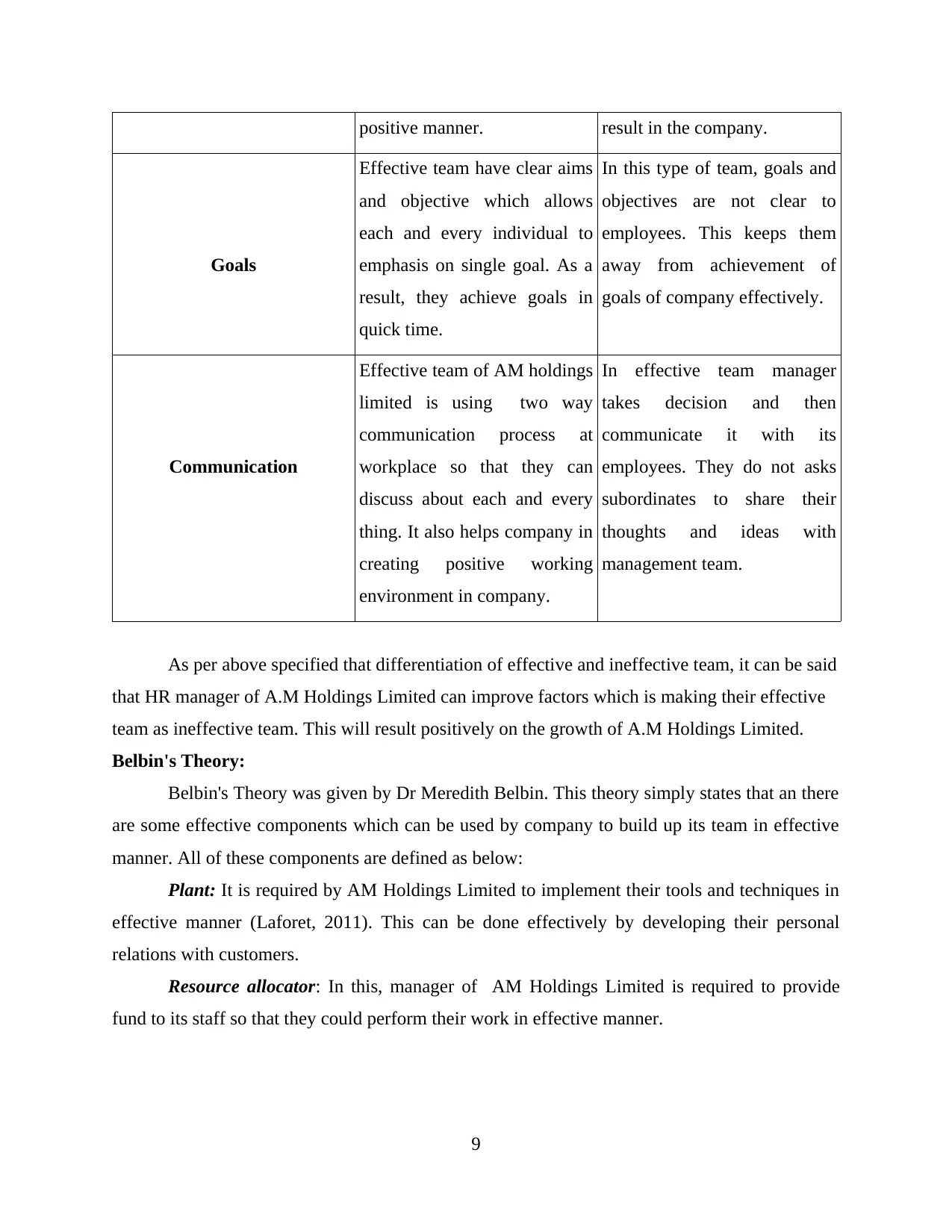
positive manner. result in the company.
Goals
Effective team have clear aims
and objective which allows
each and every individual to
emphasis on single goal. As a
result, they achieve goals in
quick time.
In this type of team, goals and
objectives are not clear to
employees. This keeps them
away from achievement of
goals of company effectively.
Communication
Effective team of AM holdings
limited is using two way
communication process at
workplace so that they can
discuss about each and every
thing. It also helps company in
creating positive working
environment in company.
In effective team manager
takes decision and then
communicate it with its
employees. They do not asks
subordinates to share their
thoughts and ideas with
management team.
As per above specified that differentiation of effective and ineffective team, it can be said
that HR manager of A.M Holdings Limited can improve factors which is making their effective
team as ineffective team. This will result positively on the growth of A.M Holdings Limited.
Belbin's Theory:
Belbin's Theory was given by Dr Meredith Belbin. This theory simply states that an there
are some effective components which can be used by company to build up its team in effective
manner. All of these components are defined as below:
Plant: It is required by AM Holdings Limited to implement their tools and techniques in
effective manner (Laforet, 2011). This can be done effectively by developing their personal
relations with customers.
Resource allocator: In this, manager of AM Holdings Limited is required to provide
fund to its staff so that they could perform their work in effective manner.
9
Goals
Effective team have clear aims
and objective which allows
each and every individual to
emphasis on single goal. As a
result, they achieve goals in
quick time.
In this type of team, goals and
objectives are not clear to
employees. This keeps them
away from achievement of
goals of company effectively.
Communication
Effective team of AM holdings
limited is using two way
communication process at
workplace so that they can
discuss about each and every
thing. It also helps company in
creating positive working
environment in company.
In effective team manager
takes decision and then
communicate it with its
employees. They do not asks
subordinates to share their
thoughts and ideas with
management team.
As per above specified that differentiation of effective and ineffective team, it can be said
that HR manager of A.M Holdings Limited can improve factors which is making their effective
team as ineffective team. This will result positively on the growth of A.M Holdings Limited.
Belbin's Theory:
Belbin's Theory was given by Dr Meredith Belbin. This theory simply states that an there
are some effective components which can be used by company to build up its team in effective
manner. All of these components are defined as below:
Plant: It is required by AM Holdings Limited to implement their tools and techniques in
effective manner (Laforet, 2011). This can be done effectively by developing their personal
relations with customers.
Resource allocator: In this, manager of AM Holdings Limited is required to provide
fund to its staff so that they could perform their work in effective manner.
9
⊘ This is a preview!⊘
Do you want full access?
Subscribe today to unlock all pages.

Trusted by 1+ million students worldwide
1 out of 16
Related Documents
Your All-in-One AI-Powered Toolkit for Academic Success.
+13062052269
info@desklib.com
Available 24*7 on WhatsApp / Email
![[object Object]](/_next/static/media/star-bottom.7253800d.svg)
Unlock your academic potential
Copyright © 2020–2026 A2Z Services. All Rights Reserved. Developed and managed by ZUCOL.





